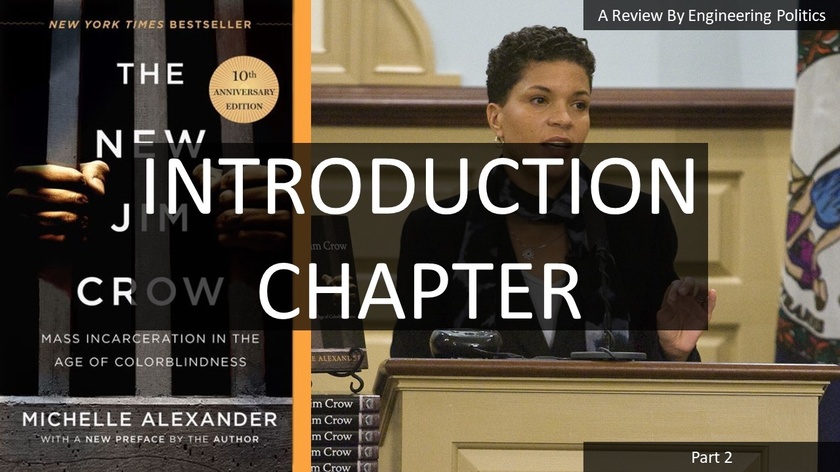
We continue on to Part 2 covering the Introduction Chapter of this book. I hope I have not scared anyone off so far. I found this book pairs well with a good straight rye whiskey… or rubbing alcohol… whichever disinfects your brain most effectively. Alexander’s tendency to plead for more democracy gets even stranger when she dedicates paragraphs of material explaining how even the black community and civil rights groups have a blind spot for criminal justice reform.
“The elected leaders of the African American community have a much broader mandate than civil rights groups, but they, too, frequently overlook criminal justice. In January 2009, for example, the Congressional Black Caucus sent a letter to hundreds of community and organization leaders who have worked with the caucus over the years, soliciting general information about them and requesting that they identify their priorities. More than thirty-five topics were listed as areas of potential special interest… No mention was made of criminal justice.”
This seems to be a ‘why isn’t everyone looking at me!’ situation. I get it. Large groups of people do not always do or focus on what is in their best interest, but then you probably should not advocate for systems that promote that way of thinking. Just sayin’.
“The colorblind public consensus that prevails in America today – i.e., the widespread belief that race no longer matters – has blinded us to the realities of race in our society and facilitated the emergence of a new caste system.”
I have spoken on my thoughts on colorblindness before. I used to believe we should strive for a colorblind society, which I still believe when it comes to creating and applying the law, but I now think colorblindness is an unachievable and unnecessary goal. We all see color, and some of us are proud of our heritage and we see that represented in our physical appearance. Fine. Not my thing, but fine. I now believe in something more like an idea Sam Harris claims, and I am paraphrasing, “we want to get to a point where we see color, but it is so absolutely uninteresting that we see it the same way we see hair color. No one cares.” But I do not think Alexander and I are looking at colorblindness the same way here. Many people who write books highlighting modern-day racism, antiracism, and Critical Race Theory (CRT) want to inject color back into our minds and make it the most interesting part about the individual. Her constant call towards the new caste system will be a reoccurring theme throughout the book and seems to be her attempt to ground the New Jim Crow into something more relatable than the old Jim Crow since, ironically, they are nothing alike. But this does not mean Alexander will not try her best to make the caste system argument, and I will quote a few important paragraphs here to end the review so you have a good idea of the angle she is taking.
“Knowing as I do the difficulty of seeing what most everyone insists does not exist, I anticipate that this book will be met with skepticism or something worse. For some, the characterization of mass incarceration as a ‘racial caste system’ may seem like a gross exaggeration, if not hyperbole. Yes, we may have ‘classes’ in the United States – vaguely defined upper, middle, and lower classes – and we may even have an ‘underclass’ (a group so estranged from mainstream society that it is no longer in reach of the mythical ladder of opportunity), but we do not, many will insist, have anything in this country that resembles a ‘caste’.”
I do not think it is a “gross exaggeration.” I think it is an attempt to connect dots that are not there in order to forward a narrative. Also, I do not think there is an “underclass” who have no opportunity to climb the economic and social ladder as long as we treat people like individuals. This is accomplishing the opposite. Alexander gets to the ‘inability to climb the economic and social ladder’ in a few paragraphs. Let’s continue.
“The aim of this book is not to venture into the long-running, vigorous debate in the scholarly literature regarding what does and does not constitute a caste system. I use the term racial caste in this book the way it is used in common parlance to denote a stigmatized racial group locked into an inferior position by law and custom. Jim Crow and slavery were caste systems. So is our current system of mass incarceration.”
She is now refining the term racial caste away from the origins of the caste system that originated in India. Smart move on her part. When words lose their definitions, you can make any claim true (shout out to Tom Sowell).
“It may be helpful, in attempting to understand the basic nature of the new caste system, to think of the criminal justice system – the entire collection of institutions and practices that compromise it – not as an independent system but rather as a gateway into a much larger system of racial stigmatization and permanent marginalization. This larger system, referred to here as mass incarceration, is a system that locks people not only behind bars in actual prisons, but also behind virtual bars and virtual walls – walls that are invisible to the naked eye but function nearly as effective as Jim Crow laws once did at locking people of color into a permanent second-class citizenship. The term mass incarceration refers not only to the criminal justice system but also to the larger web of laws, rules, policies, and customs that control those labeled criminals both in and out of prison. Once released from prison, people enter a hidden underworld of legalized discrimination and permanent social exclusion. They are members of America’s new undercaste.”
You heard it! The criminal justice system is like a gateway drug into a larger system of racism. Okay, maybe I took it a bit far beyond what Alexander meant it to be, but that is how you can relate two different entities that are not alike. A system operating invisibly to the untrained eye is how you get to antiracism and CRT. Alexander talks about “legalized discrimination” when someone is labeled a felon similar to someone in the undercaste in a caste system, except for in a caste system, people are placed in a hierarchy based on things they cannot control. Unless you make the argument that people cannot control the crimes they commit, and therefore, ought not to be held accountable or suffer consequences, criminal behavior is not a function of a caste system. I did not cover this much during this review, but Alexander talked about how she adamantly defended affirmative action during her time as a civil rights lawyer and member of the ACLU, which is another form of legalized discrimination – a form she happens to agree with.
“What is key to America’s understanding of class is the persistent belief – despite all evidence to the contrary – that anyone, with the proper discipline and drive, can move from a lower class to a higher class. We recognize that mobility may be difficult, but the key to our collective self-image is the assumption that mobility is always possible, so failure to move up reflects on one’s character. By extension, the failure of a race of ethnic group to move up reflects very poorly on the group as a whole.”
Unpacking income mobility in America would take some time to unpack, but I will just leave it up to we happen to disagree on this lack of mobility. I highlight this quote because looking at racial disparities like this using single-variable (or bivariate) analysis will come with a really bad trade-off. If your only inputs are ‘skin color’ and ‘economic status’, and your output is ‘racism’, you are using the same formula white supremacists use (racists of all kinds have one thing in common: they are bad at math). A white supremacist/nationalist claims the same thing, but instead of a failure in the ‘system’, it is a failure in the ‘genetics’ (as their output). Both outcomes have the same validity if they ignore the multivariate analysis needed to find real solutions. Additional variables like culture, education (real education, not woke education), and economic incentive structures should be accounted for before we jump to ‘everyone is racist’.
“Like Jim Crow (and slavery), mass incarceration operates as a tightly networked system of laws, policies, customs, and institutions that operate collectively to ensure the subordinate status of a group defined largely by race.”
When I read something like this, I ask myself, “who has something to gain by creating racial inequities?” Sure, the inbred redneck stereotype may do it just for pleasure, but does that accurately describe the people in power? Do the powerful just get their rocks off when they can prove to their friends that they can systemically put down a group of people? I am not sure, but entertain this for a moment.
The original Jim Crow laws were put in place to solidify the social hierarchy. The people at the top of that hierarchy were not hiding it. It was a popular idea at the time (I am not claiming it was not evil). That idea is no longer popular today, so that incentive is all but gone. Incentives have shifted towards standing up against injustices like these. They have shifted so much so that one could argue people are more incentivized towards creating perceived injustice so they have something of value to stand up against. There was not much to cash-in on back in the day of Jim Crow style racism, but there is plenty to cash-in on when making claims of standing against racism. The largest corporations in the world will sponsor you to give talks and trainings. Your new slogan of the month will get slapped all over social media and entertainment. You get to sell books filled with antiracist ideas to help save the world. Fighting against these ideas will grant you no money and might earn you a spot on the Sothern Poverty Law Center’s (SPLC) Hatewatch list. There is just plain and simply no incentive to create a racial hierarchy for most people, especially people in power, but now slap a donkey pin on your lapel and the incentive to create racial hysteria and inject race into everything you can as a political tool has increased exponentially in a world where outrage and false virtues, like tolerance, rule.
Thanks for reading my rant style review of the introduction chapter (Part 2) of The New Jim Crow: Mass Incarceration In The Age Of Colorblindness by Michelle Alexander. Please let me know if you find this useful. My goal here is to explain each chapter enough and in a somewhat objective way so others do not waste their time and money on investigating this material themselves. I always encourage anyone who wants to know more about the ideas in this book to go and read it themselves, but in case you do not want to, I am here for you. Please leave a comment with your thoughts.
Thanks for being a part of the Engineering Politics Locals Community!

I was listening to some news updates when I heard this CNN clip about the potentially hazardous water in East Palestine, and as soon as I heard her ask the question about whether or not her guest would drink the water, I IMMEDIATELY thought of this clip from South Park. Enjoy.
In this special episode of The Engineering Politics Podcast, Truman from Return To Reason is back for a new video and podcast series titled ‘Revisiting The Road To Serfdom’ where we review F.A. Hayek’s classic work, The Road To Serfdom. This episode covers ‘Chapter 15: The Prospects of International Order’.
This will be an ongoing series that covers the entire book. We put a ton of work into making this insightful and relevant, so we hope you enjoy watching/listening as much as we enjoyed reading and recording.
Become a subscriber of the Engineering Politics Locals Community to support this content. Also, consider joining the @ReturnToReason Locals Community to show Truman some support.
In this episode of The Engineering Politics Podcast, I team up with Truman from @ReturnToReason to interview one of the most intelligent and influential creators in the space of philosophy today. Stephen R.C. Hicks is a Professor of Philosophy at Rockford University, Executive Director of the Center for Ethics and Entrepreneurship, and Senior Scholar at The Atlas Society. He has written many books including Explaining Postmodernism and Nietzsche and the Nazis. We bring him on to talk about the social and political issues we are currently facing in America, and the West more broadly, and what the collectivist ideas of Jean-Jacques Rousseau might have to do with it.
Become a subscriber of the Engineering Politics Locals Community to support this content. Also, consider joining the @ReturnToReason Locals Community to show Truman some support.
In this special episode of The Engineering Politics Podcast, Truman from Return To Reason is back for a new video and podcast series titled ‘Revisiting The Road To Serfdom’ where we review F.A. Hayek’s classic work, The Road To Serfdom. This episode covers ‘Chapter 15: The Prospects of International Order’.
This will be an ongoing series that covers the entire book. We put a ton of work into making this insightful and relevant, so we hope you enjoy watching/listening as much as we enjoyed reading and recording.
Become a subscriber of the Engineering Politics Locals Community to support this content. Also, consider joining the @ReturnToReason Locals Community to show Truman some support.
In this episode of The Engineering Politics Podcast, I team up with Truman from @ReturnToReason to interview one of the most intelligent and influential creators in the space of philosophy today. Stephen R.C. Hicks is a Professor of Philosophy at Rockford University, Executive Director of the Center for Ethics and Entrepreneurship, and Senior Scholar at The Atlas Society. He has written many books including Explaining Postmodernism and Nietzsche and the Nazis. We bring him on to talk about the social and political issues we are currently facing in America, and the West more broadly, and what the collectivist ideas of Jean-Jacques Rousseau might have to do with it.
Become a subscriber of the Engineering Politics Locals Community to support this content. Also, consider joining the @ReturnToReason Locals Community to show Truman some support.
In this special episode of The Engineering Politics Podcast, Truman from @ReturnToReason is back for a new video and podcast series titled ‘Revisiting The Road To Serfdom’ where we review F.A. Hayek’s classic work, The Road To Serfdom. This episode covers ‘Chapter 14: Material Conditions and Ideal Ends’.
This will be an ongoing series that covers the entire book. We put a ton of work into making this insightful and relevant, so we hope you enjoy watching/listening as much as we enjoyed reading and recording.
Become a subscriber of the Engineering Politics Locals Community to support this content. Also, consider joining the @ReturnToReason Locals Community to show Truman some support.














